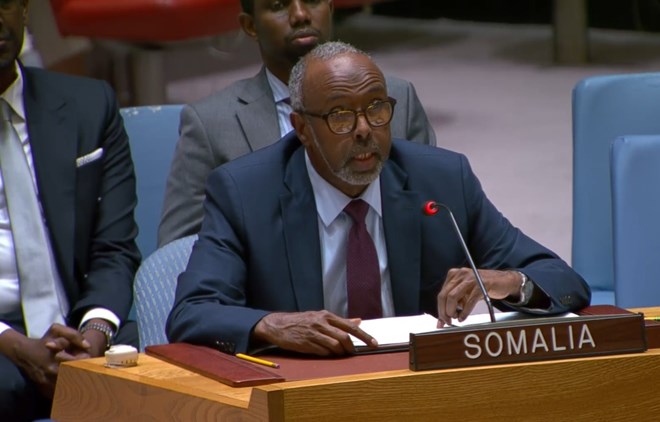
Friday August 16, 2024
Somalia says Ethiopian arms smuggling is also feeding Al-Shabaab’s insurgency

Somalia's Ambassador to the United Nations, Abukar Osman Baale, addresses the UN Security Council on August 15, 2024, following the unanimous adoption of a resolution extending the mandate of the African Union Transition Mission in Somalia (ATMIS) until December 31, 2024. Baale emphasized the importance of continued international support in Somalia’s fight against Al-Shabaab and the need for a smooth transition to a successor mission in 2025.
UNITED NATIONS, New York (HOL) — Somalia has accused Ethiopia of smuggling illegal weapons into its territory, a move that Mogadishu claims is fueling conflicts and empowering Al-Shabaab, according to Somalia’s UN Ambassador.
With a tone that hinted at indignation, Somalia’s UN Ambassador, Abukar Osman Baale, accused Ethiopia of funnelling weapons into Somalia—an act he claims is inflaming the already rampant clan conflicts and giving new life to the terror of Al-Shabaab. The claim, presented during a United Nations Security Council meeting, further strained relations between the neighbouring countries.
“My delegation expresses deep concern regarding the recent smuggling of sizable illegal weapons from a troop-contributing neighbouring country into Somalia,” Baale stated. “The proliferation of these weapons poses a significant threat to peace and security in Somalia by fueling clan conflicts and empowering Al-Shabaab.”
The July 15 incident involved Somali security forces intercepting two truckloads of illegal weapons near the Ethiopian border, leading to a violent confrontation with local militias and resulting in multiple fatalities. Somali officials insist that these weapons were smuggled from Ethiopia, though Ethiopian authorities have vehemently denied any involvement.
Relations between Somalia and Ethiopia have been on a downward spiral since January 2024, following Ethiopia’s controversial Memorandum of Understanding (MoU) with Somaliland. This agreement, which grants Ethiopia access to the Red Sea in exchange for recognizing Somaliland’s independence, has been condemned by Somalia as a violation of its sovereignty. In retaliation, Somalia expelled Ethiopia’s ambassador and ordering the shut down of Ethiopian consulates in Somaliland and Puntland.
Efforts to mediate the growing tensions have so far proven unsuccessful. Two rounds of negotiations, facilitated by Turkey in Ankara, failed to bridge the deepening divide between Somalia and Ethiopia. Despite Turkey’s attempts to act as a neutral mediator, the discussions stalled as both sides refused to budge on key issues, particularly the controversial MoU. Somalia insisted on the immediate annulment of the agreement, while Ethiopia remained steadfast in its pursuit of access to the Red Sea through Somaliland. The failure of these negotiations has only further strained relations, leaving the prospect of a diplomatic resolution increasingly remote.
As distrust between the two nations grows, Somalia has made it clear that it no longer sees Ethiopia as a reliable partner, particularly amid accusations of unauthorized troop incursions. Ethiopia, however, has firmly rejected Somalia’s accusations. Ethiopian Foreign Ministry Spokesman Nebiyu Tedla has gone on record to dismiss the allegations as “baseless."." “Ethiopia has been sacrificing in the service of peace and stability of the brotherly people of Somalia for more than three decades,” Tedla stated.Given these escalating hostilities, Somalia has requested that Ethiopian troops be excluded from the new African Union-led mission set to replace the African Union Transition Mission in Somalia (ATMIS) in January 2025. Instead, Somalia is seeking contributions from countries like Egypt and Djibouti for the post-ATMIS mission, reflecting a significant realignment of alliances in the Horn of Africa.
The arms smuggling incident has only deepened the diplomatic rift between Mogadishu and Addis Ababa. Following the discovery of the illegal weapons, Somali President Hassan Sheikh Mohamud convened an emergency National Security Council meeting. The council responded by imposing a total ban on all non-state arms trade within Somalia and directed security agencies to produce a comprehensive report on the smuggling operation. The Somali government emphasized the urgency of implementing strict arms control measures to prevent further destabilization.
Officials in Mogadishu are warning that the continued flow of weapons from Ethiopia could not only intensify internal conflicts but also strengthen Al-Shabaab. The recent attack on Lido Beach in Mogadishu, which resulted in the deaths of over 30 people, serves as a grim reminder of the dangers posed by unchecked arms trafficking.